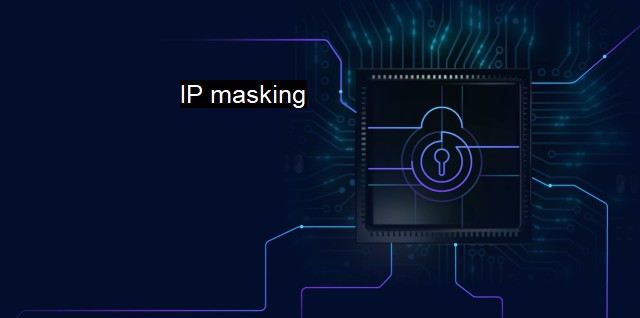What is IP masking?
IP Masking: The Ultimate Solution to Online Security and Privacy in Today's World of Increasing Online Threats
IP masking is a fascinating facet of cybersecurity and is incorporated into several antivirus applications. It involves obscuring the IP address of a computer or another internet-enabled device to ensure safe online activities. The IP (Internet Protocol) address is a unique numeric marker used to indicate every device on the internet; hence, one could compare it to a physical address or phone number - unique identifiers that are critical for communication across the internet channels.IP masking is often compared to wearing an online 'mask' or 'disguise', concealing the true identity of the device during internet interactions. The primary purpose of this practice is to protect against malicious activities that can occur when the system's original IP address is discovered, like hacker attacks or identity thefts. By using an 'alternate identity,' the risks associated with having the authentic IP compensated are mitigated significantly.
An IP address can potentially reveal a lot about an individual user. This information ranges from their geographic location to the browser used, browsing history, and even online behavior patterns. an expert could determine the user's home city or figure out that the user has recently visited a particular website. Therefore, IP masking is a valuable tool for safeguarding an individual's (or corporate unit's) confidentiality, protecting the connection track from being intercepted by rogues, and ensuring that the online behavior remains as private as possible.
In the domain of cybersecurity, IP masking finds its utility in secure remote server-access applications. For instance, if a company employee intends to securely connect to the company's servers while telecommuting, IP masking tools can disguise their IP address. Thus, even if a third party intercepts the communication, they could only decentralized detection points instead of victimizing the original hardware.
IP masking enables users to bypass censorship restrictions placed by regions or countries. Several countries censor the internet usage of their citizens, resulting in blocked access to certain websites and content. IP masking allows the user to appear as if they are accessing the internet from a different geographic location, thus bypassing these unjust blockades.
Although the central theme of IP masking is anonymization of user behavior online, it is not foolproof, notably when considering powerful adversaries like comprehensive surveillance systems or advanced persistent threats with substantial resources. it is still formidable enough to make cyber-attackers' tasks harder than usual, or at least time-consuming enough to deter any unauthorized access attempts.
It is worth noting that although IP masking has legitimate uses like providing security and privacy, it can sometimes be used for illicit purposes. For instance, cybercriminals often use IP masking to hide their identities while perpetrating online fraud, cyber-attacks, unauthorized breaches, or data theft.
There are several antivirus software that incorporate IP masking as a part of their offerings. Such a feature allows users not only to protect their devices from viruses and malware, but also to maintain privacy and anonymity online. These antivirus solutions often partner with VPN (Virtual Private Network) providers to enable IP masking for their users.
Concluding, while cybersecurity is a vast concept encompassing various practices and processes, IP masking is an intrinsic part of building a safer digital environment. It offers a significant degree of protection against compromises, unauthorized access, and cyber-attacks striving to exploit revealed IP addresses. As technology continues to evolve, IP masking will become widespread, contributing to an environment where users are safeguarded better against various cyber threats while enjoying their online freedom.

IP masking FAQs
What is IP masking?
IP masking is a technique used to hide the real IP address of a device or network by assigning a different IP address to it so that no one can trace the original IP address.What is the purpose of IP masking?
The primary purpose of IP masking is to protect the privacy and security of an individual or a company's network by preventing cybercriminals or malicious websites from tracking the real IP address and gaining unauthorized access to the system.How can I mask my IP address?
You can mask your IP address by using a virtual private network (VPN) or proxy server. VPN encrypts your Internet traffic and routes it through a remote server, while a proxy server acts as a middleman between your device and the Internet by masking your IP address with its IP address.Is IP masking illegal?
No, IP masking is not illegal as long as you use it for legitimate and legal purposes. However, if you use it for illegal activities such as hacking, spreading viruses, or engaging in cybercrime, then it becomes illegal, and you can be subject to prosecution.| | A | | | B | | | C | | | D | | | E | | | F | | | G | | | H | | | I | | | J | | | K | | | L | | | M | |
| | N | | | O | | | P | | | Q | | | R | | | S | | | T | | | U | | | V | | | W | | | X | | | Y | | | Z | |
| | 1 | | | 2 | | | 3 | | | 4 | | | 7 | | | 8 | | |||||||